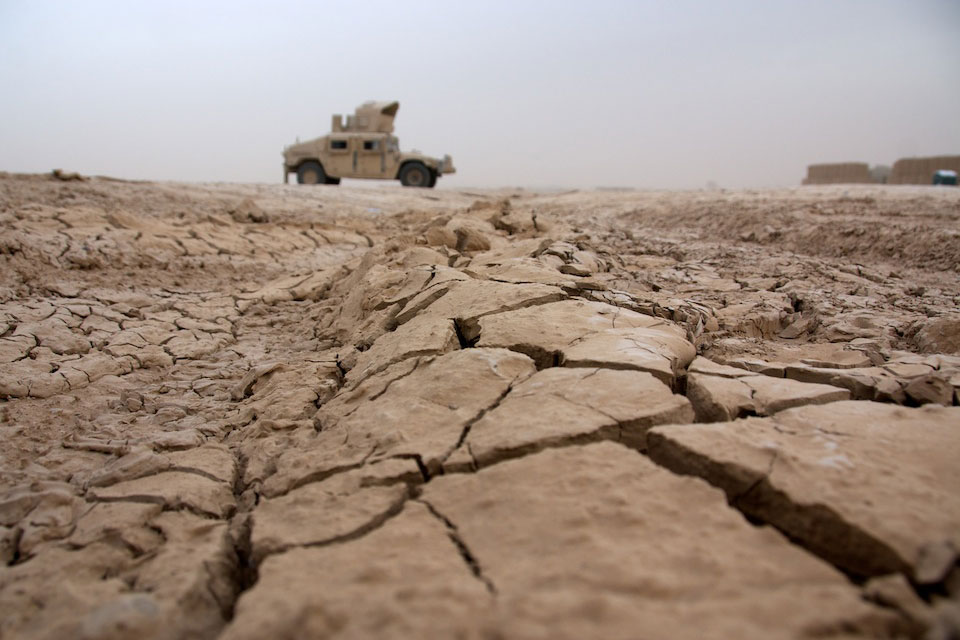By Miranda Stewart
At a time when reducing greenhouse gas emissions is more urgent than ever, a recent report makes clear that NATO military spending targets are pushing the world in the opposite direction. The report, ‘Climate Crossfire: How NATO’s 2% military spending targets contribute to climate breakdown’, was published in October by multiple environmental and social-justice organisations.
The authors estimate that NATO’s military carbon footprint rose to 226 million metric tonnes of CO2 equivalent (tCO2e) in 2023 from 196 million CO2e in 2021. NATO asks that all members put at least 2% of their national GDP towards military spending and that 20% of that military spending goes towards equipment. The 2% goal, while not directly enforceable, has increasing political pressure behind it in the context of growing inter-imperialist tension.
Global spending rises
The authors conclude that instead of this utter waste climate action must be immediately prioritised: “An unprecedented cut in emissions in the next few years will happen only if every prominent political initiative, and especially global diplomatic efforts, prioritise one goal above all – working to radically and equitably transform the fossil-fuel economy into a renewable one.”
NATO’s spending targets imperil climate justice in multiple ways. As the report discusses, they are leading to increased carbon emissions while likely diverting funds from climate mitigation and adaptation. Additionally, beyond the focus of the report, the world’s swelling military budgets are routinely used to enact environmental injustice, such as displacement, extractivism, environmental hazards, and ecological destruction forced on marginalised communities.
The demands for increased military spending are motivated both by the escalating New Cold War with Chinese imperialism and by the profit motives of the arms industry. Total global military spending is already at an all-time high of $2.24 trillion. By comparison, global spending on climate finance in 2021 / 2022 was approximately $1.3 trillion. NATO military spending was $1.16 trillion in 2021. If all member countries met the 2% target that year, it would have been greater by $90 billion dollars. That would mean spending over 50% more in some countries.
Increasing emissions
Not surprisingly, NATO military spending is already much higher than that of its Cold War rivals. It was $2,327 billion in 2021 and 2022, compared to $158 billion for the Collective Treaty Security Organization (CSTO, composed of Russia and allies) and $578 billion for China. The report also predicts that non-NATO military spending will likely rise in response to the arms race NATO is leading. That will further increase greenhouse gas emissions and the severity of armed conflicts.
Military spending and greenhouse gas emissions are closely tethered. The production and use of military equipment, in particular, are major sources of pollution. As a result, NATO’s standard that at least 20% of military spending be on equipment helps guarantee additional damage. For all the arms industry’s attempts at greenwashing, there is no realistic potential to decouple military spending from greenhouse gas emissions with technological advances. If all members met the 2% and 20% goals, it would directly lead to a 50% increase in annual greenhouse gas emissions from 196 million tCO2e in 2021 to 295 million TCO2e in 2028.
Climate refugees
Capitalist politicians of imperial powers, regardless of political party, are clearly willing to continue environmental injustice both in service of and by way of military spending. The just-passed National Defense Authorization Act in the US includes a provision, proposed by President Biden, allowing the Department of Defense to participate in enforcing the US’s inhumane and often lethal treatment of migrants at the southern border. The militarised responses to migration by NATO and the EU as well, have had notoriously deadly consequences in the Mediterranean. Many of the migrants in both cases are climate refugees and displaced Indigenous people. People are driven from their homes by the same destructive forces of capitalist extraction and violence that then attack them for seeking safety.
War enables fossil fuel extraction, in addition to requiring and incentivising it. Since 7 October, six oil companies, including BP, have made a deal with Israel for oil exploration off the coast of Gaza. Genocide is clearing the way for the fossil fuel industry, which in a vicious cycle can then sell that oil for use in further violent dispossession of Indigenous people.
Break with capitalism
While NATO members and other nations throw ever-growing amounts of money into the arms industry to support the imperialist intentions of the US and its allies, they refuse to prioritise climate change despite it being a threat to humanity itself. No members of NATO have committed to the 43% reduction in emissions that the International Panel on Climate Change (IPCC) found is needed by 2030 even to limit warming to 1.5 degrees C.
All of this is an indictment of the brutal and destructive nature of the capitalist system we live under, where the production of weapons to destroy human life is prioritised over the needs of people and our ecosystem. We need to take the weapons industry out of the hands of warmongering capitalist profiteers and use these resources, including the capabilities of its workforce, to enact a global transition to renewable energy and other measures that will ameliorate the destruction done to our planet. We have no time to lose, we need international socialist change now.












